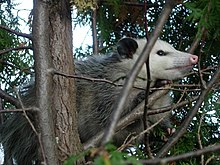Opossum
Opossums are the largest order of marsupials in the Western Hemisphere, the Didelphimorphia.
| Didelphimorphia Temporal range: Upper Cretaceous – Recent
| |
|---|---|

| |
| Virginia opossum Didelphis virginiana | |
| Scientific classification | |
| Kingdom: | |
| Phylum: | |
| Class: | |
| Infraclass: | |
| Order: | Didelphimorphia
|
| Family: | Didelphidae
|
They are often called possums, though that term is more properly applied to Australian fauna of the suborder Phalangeriformes.
The Virginia opossum was the first animal to be called an opossum: the word comes from the Algonquian language, and means "white beast." It was one of the few South American marsupials to establish itself permanently in North America after the Great American Interchange, and the only one to survive there today.
Scientists used to believe that opossums hosted large numbers of ticks, but now they think they do not. Wildlife scientist Cecilia Hennessy thinks this belief came from a paper called "Hosts as ecological traps for the vector of Lyme disease."[1] Hennessy did her own study and found that opossums do not eat many ticks.[2] She and her team looked at opossums' stomachs and found animals without bones like beetles and worms, animals with bones like amphibians and small mammals, plants including grass, leaves and seeds, and garbage.[3]
Marsupials like opossums are born before their jaw bones have grown enough for them to drink their mothers' milk the way other baby mammals do. Scientists from King's College London found that opossums and other marsupials use tissue from their inner ear to make a temporary jaw so they can feed and grow.[4][5]
References
change- ↑ Keesing; Brunner; Duerr; Killilea; LoGiudice; Schmidt; Vuong; Ostfeld (August 19, 2009). "Hosts as ecological traps for the vector of Lyme disease". Proceedings of the Royal Society B: Biological Sciences. 276 (1675). Royal Society Publishing: 3911–3919. doi:10.1098/rspb.2009.1159. PMC 2825780. PMID 19692412.
- ↑ Hennessy, Cecilia (August 1, 2023). "Debunking the Myth: Opossums Don't Eat Ticks". Outdoor Illinois Journal. Retrieved October 5, 2023.
- ↑ Hennessy; Hild (July 20, 2021). "Are Virginia opossums really ecological traps for ticks? Groundtruthing laboratory observations". Science Direct. Retrieved October 5, 2023.
- ↑ eLife (June 30, 2020). "Hints at jaw evolution found in marsupials and monotremes" (Press release). Eurekalert.org. Retrieved July 1, 2020.
- ↑ Neal Anthwal; Jane Catherine Fenelon; Stephen D Johnston; Marilyn B Renfree; Abigail S Tucker (June 30, 2020). "Transient role of the middle ear as a lower jaw support across mammals". eLife. 9. doi:10.7554/eLife.57860. PMC 7363448. PMID 32600529.